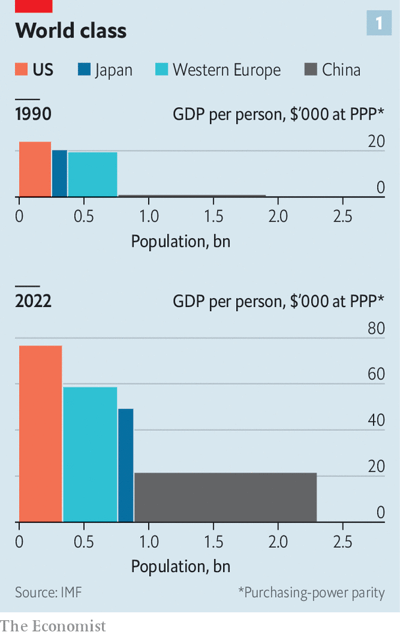This will be resolved based on the percentage difference in GDP per person in US dollars at purchase power parity (PPP).

I define Western Europe as something like the EU prior to the admission of Poland (minus Greece, plus Switzerland, Norway), but I don't expect to litigate the concept; the economies are highly correlated and the big countries will drive the result.

People are also trading
Tricky one. I think Western European countries have a lot of economic growth they can catch up with, without needing to reinvent the wheel, that they missed out on during 2008-2020. There's various means by which they achieve this, such as reforming capital investment schemes to promote more venture capital and allowing funds to take higher risk bets. Western Europe can expand its domestic tech sector and rapidly achieve growth if it chooses this option. But that's also the catch, it might not have the political will and coordination required to go this route. It's super easy to continue being complacent, patting themselves on the back for regulating foreign tech companies 🤷
2030 isn't that far away, and it's not enough time for robotics to really have an impact. It's not obvious what the key engines for growth in Europe will be over this timeframe, these will be contingent on bets that have already been made. But a lot of these bets *are* good so far, what's lacking in the mid 2020s is a clear European industrial policy that is an answer to the inflation reduction act and the belt and road project.
I think the decisions necessary to go for these low hanging fruit will likely be taken over the next 5 years, but that won't be enough time to have their real impact felt. So by 2030 I wouldn't bet strongly on significant western European economic growth.
I think for the US it's a mixed bag. The inflation reduction act is going to give the US a strong GDP growth modifier over the next decade, but there's plenty of reasons to bet against continuous American growth from now until 2030. The US seems especially vulnerable to political, social and labor force disruptions over this timeframe
I think if Russia is conclusively defeated in Ukraine, then the EU suddenly has a pathway to becoming a near-total hegemon on the continent. That sort of scenario is likely to create the conditions for significant growth towards the end of the decade as the geopolitical calculus changes. But it's hard to predict how likely this scenario is.